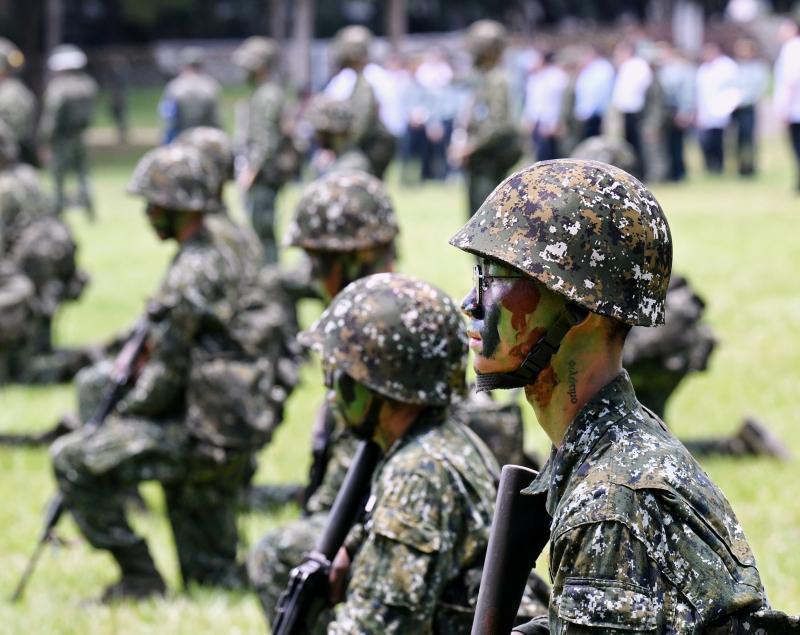In the first year of reinstating one-year mandatory military service last year, 993 people signed up for voluntary service, a rate of 14.2 percent, the Ministry of National Defense (MND) said today.
Ministry spokesperson Major General Sun Li-fang (孫立方) and Major General Cheng Chia-chi (成家麒), who heads the human resources division at the ministry’s Department of Resource and Planning, provided an update on the implementation of one-year conscription at a news conference.
The 993 people who chose to serve voluntarily were out of a total of 6,956 conscripts, the ministry said.

Photo: Fang Pin-chao, Taipei Times
The first group of conscripts reported for duty on Jan. 25 last year, with the first of them being discharged on Jan. 18, Cheng said.
The conscripts passed through basic training and joint exercises, Cheng added.
Of the 6,956 recruits last year, 2,047 have been discharged so far, he said.
In addition to the 993 soldiers who switched to volunteer service, 1,871 personnel volunteered for combat units and 331 were discharged early or suspended service for medical reasons, for a total of 3,761 serving in garrison units, Cheng said.
This year, the Ministry of the Interior estimates that 9,839 conscripts would be drafted, Cheng said.
Training is to expand to include new weaponry, such as missiles and anti-tank weapons, Cheng added.
The recent freezes and cuts to the ministry’s budget would not affect conscript training, including on new weapons, said Chen Chun-nan (陳俊男), head of the training division.
To ensure conscripts go through comprehensive training, there is one 13-week base training period, in addition to an eight-week, four stage boot camp.
With regards to the recent "immediate response" drills, officials said that the exercise was focused on regular forces, with conscripts tasked with a supporting role.

The manufacture of the remaining 28 M1A2T Abrams tanks Taiwan purchased from the US has recently been completed, and they are expected to be delivered within the next one to two months, a source said yesterday. The Ministry of National Defense is arranging cargo ships to transport the tanks to Taiwan as soon as possible, said the source, who is familiar with the matter. The estimated arrival time ranges from late this month to early next month, the source said. The 28 Abrams tanks make up the third and final batch of a total of 108 tanks, valued at about NT$40.5 billion

Two Taiwanese prosecutors were questioned by Chinese security personnel at their hotel during a trip to China’s Henan Province this month, the Mainland Affairs Council (MAC) said yesterday. The officers had personal information on the prosecutors, including “when they were assigned to their posts, their work locations and job titles,” MAC Deputy Minister and spokesman Liang Wen-chieh (梁文傑) said. On top of asking about their agencies and positions, the officers also questioned the prosecutors about the Cross-Strait Joint Crime-Fighting and Judicial Mutual Assistance Agreement, a pact that serves as the framework for Taiwan-China cooperation on combating crime and providing judicial assistance, Liang

A group from the Taiwanese Designers in Australia association yesterday represented Taiwan at the Midsumma Pride March in Melbourne. The march, held in the St. Kilda suburb, is the city’s largest LGBTQIA+ parade and the flagship event of the annual Midsumma Festival. It attracted more than 45,000 spectators who supported the 400 groups and 10,000 marchers that participated this year, the association said. Taiwanese Designers said they organized a team to march for Taiwan this year, joining politicians, government agencies, professionals and community organizations in showing support for LGBTQIA+ people and diverse communities. As the first country in Asia to legalize same-sex

MOTIVES QUESTIONED The PLA considers Xi’s policies toward Taiwan to be driven by personal considerations rather than military assessment, the Epoch Times reports Chinese President Xi Jinping’s (習近平) latest purge of the Chinese People’s Liberation Army (PLA) leadership might have been prompted by the military’s opposition to plans of invading Taiwan, the Epoch Times said. The Chinese military opposes waging war against Taiwan by a large consensus, putting it at odds with Xi’s vision, the Falun Gong-affiliated daily said in a report on Thursday, citing anonymous sources with insight into the PLA’s inner workings. The opposition is not the opinion of a few generals, but a widely shared view among the PLA cadre, the Epoch Times cited them as saying. “Chinese forces know full well that